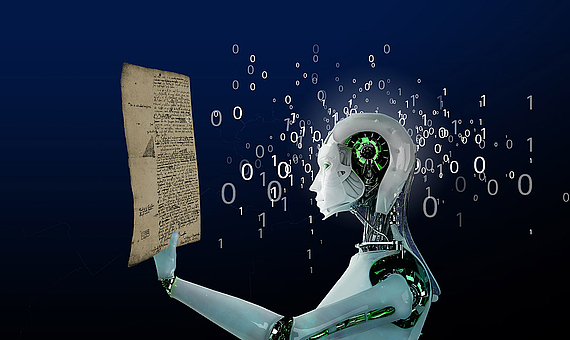Artificial intelligence, machine learning, automation, robots in geriatric care or self-driving cars increasingly become a reality. In the 17th century, the philosopher based in Hannover pondered over a machine able to perform calculations "without significant mental effort". Instead of "Deep Thought" - like in the series of novels "The Hitchhiker's Guide to the Galaxy" (1979-1992) by Douglas Adams, or the legendary chess computer named after it, which was the first device able to beat a grandmaster in 1988 - Leibniz called his machine a "living calculating bench". In a medallion design, he confidently referred to his invention as "SUPRA HOMINEM", superior to humans. According to Leibniz, "if a machine is used, even the most simple-minded could achieve the correct results." Merely "by turning a handle, calculations usually performed on paper are transferred into the machine".
This marked the beginning of mechanising thought processes. Leibniz once stated that he had developed a "kind of alphabet of human thoughts" when he was only 12 years old. A sign system consisting of basic principles that could be combined in order to form an intellectual opinion. A universal calculation with mechanic rules that could solve and settle every problem.
"Characters for random expressions must be invented, which, after they have been connected, can be used to verify the sentences composed of these expressions." According to Leibniz, by using such logical connectives to formalise science, every statement can be substantiated through "calculations".
To Leibniz, the idea of machines intelligent enough to solve even complex tasks did not seem far-fetched: "Without a doubt, humans would be capable of building a machine with the ability to move through a city for a while and drive around specific street corners accurately [...] and build a ship [...] able to head for a specific port on its own [...]".


 ©
ariadne-a-mazed / pixabay.com
©
ariadne-a-mazed / pixabay.com
Mechanic marvels, automated figures and machines were frequently displayed objects in baroque cabinets of curiosities. René Descartes even used them as a source of inspiration for imagining physiological processes within the human body that were inexplicable at that time. Descartes compared the heart to a pump and used channels and sluice gates as an analogy for blood circulation. Ultimately, he considered the human body a "divine machine". It seemed reasonable to suppose that humankind could become the creator of machines resembling human beings. Leibniz had no doubts about this: "[Humans] could build an object able to imitate a human." At the same time, he considered the philosophical question how people and machines differ, the issue of "natural and bodiless automates". Can a machine have anthropomorphic traits or even a soul? To this day, this is both a technical and philosophical issue. Is a pocket calculator intelligent because it can perform calculations more efficiently than humans can? Where does intelligence begin? Today, such questions are discussed in machine ethics. Can machines act morally? Is it more ethical if a robot vacuum cleaner vacuums up a spider instead of a ladybird? How do we differ from a moral machine? For Leibniz, the answer was obvious: "For instance, if we form a mental image of a machine able to think, feel and perceive, we could imagine it to be [...] as large as a mill, so that we could step inside. If we take a closer look, we would only find pieces pushing each other around [...]". Through divine abilities, humans can act rationally and possess a soul, while machines only consist of "pieces pushing each other around". After 7.5 million years of calculations, the supercomputer in the Douglas Adams novel answers the "great question" of "life, the universe and everything" quite rationally: "'Forty-two', said Deep Thought, with infinite majesty and calm." Because, according to the machine, in order to find an answer, one has to ask the right question. In the end, humans are responsible for the result of algorithms. Or, as Leibniz put it, the difference is that we "can think and act humanely and rationally".










